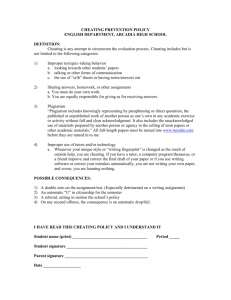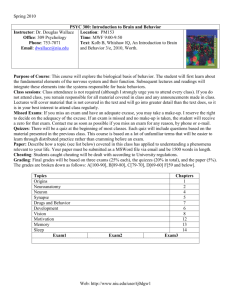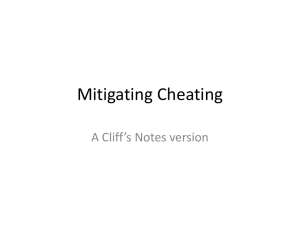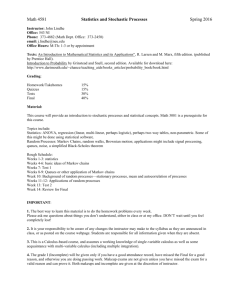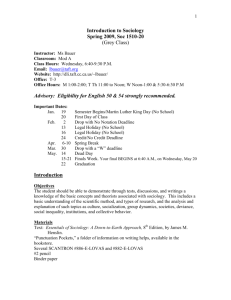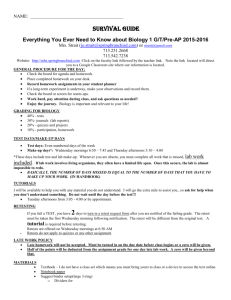7 - Conejo Valley Unified School District
advertisement
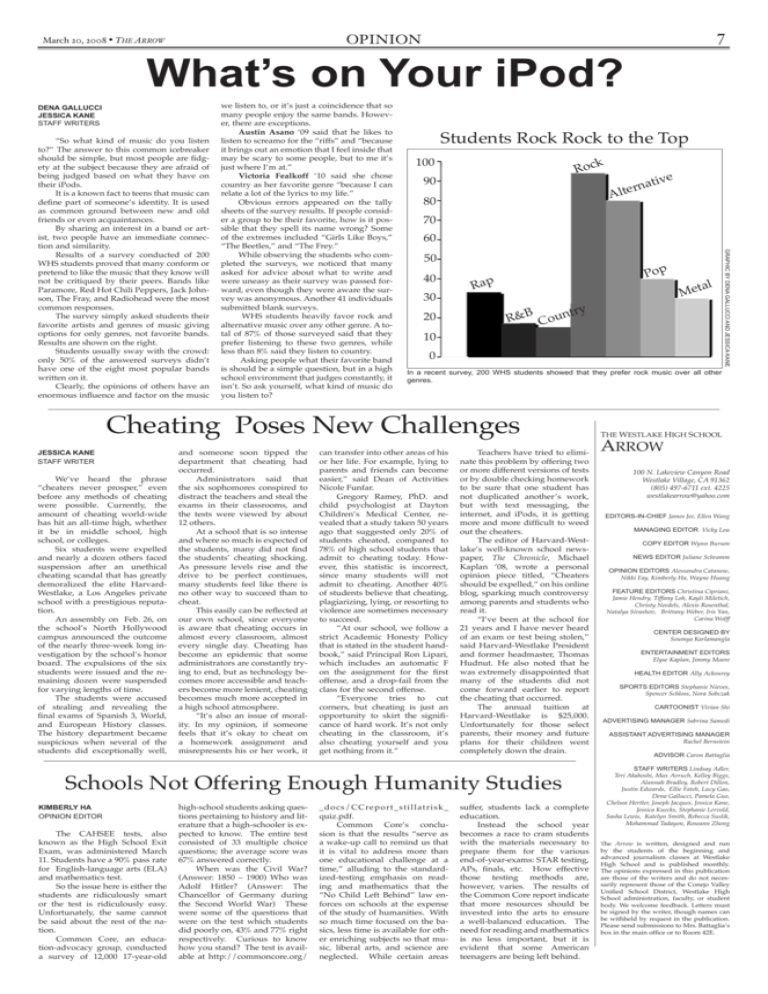
7 OPINION March 20, 2008 • THE ARROW What’s on Your iPod? DENA GALLUCCI JESSICA KANE STAFF WRITERS Students Rock Rock to the Top 100 k Roc 90 A 80 70 60 50 40 30 20 10 Pop Rap try We’ve heard the phrase “cheaters never prosper,” even before any methods of cheating were possible. Currently, the amount of cheating world-wide has hit an all-time high, whether it be in middle school, high school, or colleges. Six students were expelled and nearly a dozen others faced suspension after an unethical cheating scandal that has greatly demoralized the elite HarvardWestlake, a Los Angeles private school with a prestigious reputation. An assembly on Feb. 26, on the school’s North Hollywood campus announced the outcome of the nearly three-week long investigation by the school’s honor board. The expulsions of the six students were issued and the remaining dozen were suspended for varying lengths of time. The students were accused of stealing and revealing the final exams of Spanish 3, World, and European History classes. The history department became suspicious when several of the students did exceptionally well, and someone soon tipped the department that cheating had occurred. Administrators said that the six sophomores conspired to distract the teachers and steal the exams in their classrooms, and the tests were viewed by about 12 others. At a school that is so intense and where so much is expected of the students, many did not find the students’ cheating shocking. As pressure levels rise and the drive to be perfect continues, many students feel like there is no other way to succeed than to cheat. This easily can be reflected at our own school, since everyone is aware that cheating occurs in almost every classroom, almost every single day. Cheating has become an epidemic that some administrators are constantly trying to end, but as technology becomes more accessible and teachers become more lenient, cheating becomes much more accepted in a high school atmosphere. “It’s also an issue of morality. In my opinion, if someone feels that it’s okay to cheat on a homework assignment and misrepresents his or her work, it 0 In a recent survey, 200 WHS students showed that they prefer rock music over all other genres. can transfer into other areas of his or her life. For example, lying to parents and friends can become easier,” said Dean of Activities Nicole Funfar. Gregory Ramey, PhD. and child psychologist at Dayton Children’s Medical Center, revealed that a study taken 50 years ago that suggested only 20% of students cheated, compared to 78% of high school students that admit to cheating today. However, this statistic is incorrect, since many students will not admit to cheating. Another 40% of students believe that cheating, plagiarizing, lying, or resorting to violence are sometimes necessary to succeed. “At our school, we follow a strict Academic Honesty Policy that is stated in the student handbook,” said Principal Ron Lipari, which includes an automatic F on the assignment for the first offense, and a drop-fail from the class for the second offense. “Everyone tries to cut corners, but cheating is just an opportunity to skirt the significance of hard work. It’s not only cheating in the classroom, it’s also cheating yourself and you get nothing from it.” Teachers have tried to eliminate this problem by offering two or more different versions of tests or by double checking homework to be sure that one student has not duplicated another’s work, but with text messaging, the internet, and iPods, it is getting more and more difficult to weed out the cheaters. The editor of Harvard-Westlake’s well-known school newspaper, The Chronicle, Michael Kaplan ‘08, wrote a personal opinion piece titled, “Cheaters should be expelled,” on his online blog, sparking much controversy among parents and students who read it. “I’ve been at the school for 21 years and I have never heard of an exam or test being stolen,” said Harvard-Westlake President and former headmaster, Thomas Hudnut. He also noted that he was extremely disappointed that many of the students did not come forward earlier to report the cheating that occurred. The annual tuition at Harvard-Westlake is $25,000. Unfortunately for those select parents, their money and future plans for their children went completely down the drain. Schools Not Offering Enough Humanity Studies KIMBERLY HA OPINION EDITOR The CAHSEE tests, also known as the High School Exit Exam, was administered March 11. Students have a 90% pass rate for English-language arts (ELA) and mathematics test. So the issue here is either the students are ridiculously smart or the test is ridiculously easy. Unfortunately, the same cannot be said about the rest of the nation. Common Core, an education-advocacy group, conducted a survey of 12,000 17-year-old high-school students asking questions pertaining to history and literature that a high-schooler is expected to know. The entire test consisted of 33 multiple choice questions; the average score was 67% answered correctly. When was the Civil War? (Answer: 1850 – 1900) Who was Adolf Hitler? (Answer: The Chancellor of Germany during the Second World War) These were some of the questions that were on the test which students did poorly on, 43% and 77% right respectively. Curious to know how you stand? The test is available at http://commoncore.org/ al Met R&B Coun Cheating Poses New Challenges JESSICA KANE STAFF WRITER tive na lter GRAPHIC BY DENA GALLUCCI AND JESSICA KANE “So what kind of music do you listen to?” The answer to this common icebreaker should be simple, but most people are fidgety at the subject because they are afraid of being judged based on what they have on their iPods. It is a known fact to teens that music can define part of someone’s identity. It is used as common ground between new and old friends or even acquaintances. By sharing an interest in a band or artist, two people have an immediate connection and similarity. Results of a survey conducted of 200 WHS students proved that many conform or pretend to like the music that they know will not be critiqued by their peers. Bands like Paramore, Red Hot Chili Peppers, Jack Johnson, The Fray, and Radiohead were the most common responses. The survey simply asked students their favorite artists and genres of music giving options for only genres, not favorite bands. Results are shown on the right. Students usually sway with the crowd: only 50% of the answered surveys didn’t have one of the eight most popular bands written on it. Clearly, the opinions of others have an enormous influence and factor on the music we listen to, or it’s just a coincidence that so many people enjoy the same bands. However, there are exceptions. Austin Asano ‘09 said that he likes to listen to screamo for the “riffs” and “because it brings out an emotion that I feel inside that may be scary to some people, but to me it’s just where I’m at.” Victoria Fealkoff ‘10 said she chose country as her favorite genre “because I can relate a lot of the lyrics to my life.” Obvious errors appeared on the tally sheets of the survey results. If people consider a group to be their favorite, how is it possible that they spell its name wrong? Some of the extremes included “Girls Like Boys,” “The Beetles,” and “The Frey.” While observing the students who completed the surveys, we noticed that many asked for advice about what to write and were uneasy as their survey was passed forward, even though they were aware the survey was anonymous. Another 41 individuals submitted blank surveys. WHS students heavily favor rock and alternative music over any other genre. A total of 87% of those surveyed said that they prefer listening to these two genres, while less than 8% said they listen to country. Asking people what their favorite band is should be a simple question, but in a high school environment that judges constantly, it isn’t. So ask yourself, what kind of music do you listen to? _docs/CCreport_stillatrisk_ quiz.pdf. Common Core’s conclusion is that the results “serve as a wake-up call to remind us that it is vital to address more than one educational challenge at a time,” alluding to the standardized-testing emphasis on reading and mathematics that the “No Child Left Behind” law enforces on schools at the expense of the study of humanities. With so much time focused on the basics, less time is available for other enriching subjects so that music, liberal arts, and science are neglected. While certain areas suffer, students lack a complete education. Instead the school year becomes a race to cram students with the materials necessary to prepare them for the various end-of-year-exams: STAR testing, APs, finals, etc. How effective those testing methods are, however, varies. The results of the Common Core report indicate that more resources should be invested into the arts to ensure a well-balanced education. The need for reading and mathematics is no less important, but it is evident that some American teenagers are being left behind. THE WESTLAKE HIGH SCHOOL ARROW 100 N. Lakeview Canyon Road Westlake Village, CA 91362 (805) 497-6711 ext. 4225 westlakearrow@yahoo.com EDITORS-IN-CHIEF James Jee, Ellen Wang MANAGING EDITOR Vicky Lou COPY EDITOR Wynn Burson NEWS EDITOR Juliane Schramm OPINION EDITORS Alessandra Catanese, Nikki Fay, Kimberly Ha, Wayne Huang FEATURE EDITORS Christina Cipriani, Jamie Hendry, Tiffany Loh, Kayli Miletich, Christy Needels, Alexis Rosenthal, Natalya Sivashov, Brittany Weber, Iris Yan, Carina Wolff CENTER DESIGNED BY Soumya Karlamangla ENTERTAINMENT EDITORS Elyse Kaplan, Jimmy Moore HEALTH EDITOR Ally Ackourey SPORTS EDITORS Stephanie Nieves, Spencer Schloss, Nora Sobczak CARTOONIST Vivian Shi ADVERTISING MANAGER Sabrina Samedi ASSISTANT ADVERTISING MANAGER Rachel Bernstein ADVISOR Caron Battaglia STAFF WRITERS Lindsay Adler, Teri Akahoshi, Max Avruch, Kelley Biggs, Alannah Bradley, Robert Dillon, Justin Edwards, Ellie Fateh, Lucy Gao, Dena Gallucci, Pamela Guo, Chelsea Hertler, Joseph Jacques, Jessica Kane, Jessica Kuecks, Stephanie Lervold, Sasha Lewis, Katelyn Smith, Rebecca Suslik, Mohammad Tadayon, Roseann Zhong The Arrow is written, designed and run by the students of the beginning and advanced journalism classes at Westlake High School and is published monthly. The opinions expressed in this publication are those of the writers and do not necessarily represent those of the Conejo Valley Unified School District, Westlake High School administration, faculty, or student body. We welcome feedback. Letters must be signed by the writer, though names can be withheld by request in the publication. Please send submissions to Mrs. Battaglia’s box in the main office or to Room 42E.


